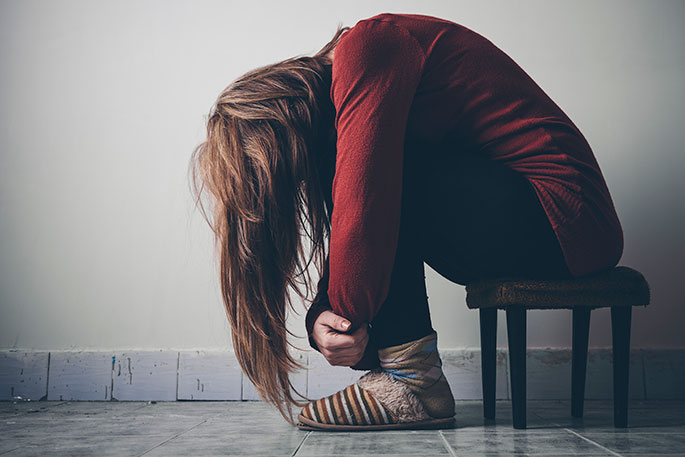'I lost a job about four years ago that was a direct result of having endometriosis.”
Laura, who doesn't want to use her real name out of fear of losing her new job, has experienced her fair share of discrimination for a condition many people believe is 'just that time of the month”.
The 26-year-old Tauranga woman, who has suffered endometriosis since the age of 14, was formally diagnosed seven years ago after continuous visits to the doctor.
Endometriosis is a condition where a layer of tissue that normally grows inside the uterus grows outside of it. It is most commonly found in ovaries, fallopian tubes, and tissue around the uterus and ovaries, but in some cases can form in other parts of a woman's or man's body.
Each person suffers differently, but the main symptoms are chronic pelvic pain, pains during sexual intercourse, weight issues, irritable bowel syndrome and infertility.
Unfortunately, Laura has experienced almost all of those symptoms.
'I always thought something was wrong,” explains Laura, 'The doctors kept telling me that it was normal period pain, but I knew when talking to some of my friends that no-one else struggled as much as I did.”
She says she experienced a low point after visiting the doctor each month and not getting anywhere.
One day while flicking through a magazine, Laura found an article about endometriosis.
'I could tick off almost every single symptom on that list,” she says, 'I ripped it out of the magazine and took it to the doctor and that was how I got taken seriously.”
Since her diagnosis she has had three laparoscopic surgeries to identify and diagnose the source, been put on several different contraceptives, had an intrauterine device inserted, taken medication to suppress production of hormones, and has been prescribed painkillers for when the pain gets unbearable. But none of these have worked in the long-term.
She says her pains can be 'horrendous” at times. When she was first diagnosed the pains were only when she had her period, but in the last couple of years it has been constant.
'The severe pain used to start a couple of days just before my period, but now it's almost every day, and it's got to the point where I'm just used to it.
'It's the emotional side that affects me the most. When you are living in constant pain your emotions are never quite in check.”
At 26, Laura also has another thing on her mind. Like many women she wants to have children.
'We've been told we can't have kids and all of my friends are starting to have kids which feels like another kick in the guts.”
Her partner of nearly 10 years has been supportive through the diagnosis, but Laura is due to start her second lot of IVF treatment and emotions are running high.
'My partner has been incredibly supportive through everything, especially with infertility, but someone who is in a new relationship or who is single, having to explain it to a new partner, I just can't imagine how hard that would be.”
Laura says it has been hard enough to come to terms with the fact that she can't have children naturally, but hearing comments such as 'Oh you'll be the next one to have a baby” can be very hurtful.
'I could have a sick day, and someone will say, ‘oh maybe she's pregnant' and really that's not possible. People don't quite understand how hurtful funny little comments like that can be.”
Laura says women need to stop being told they are just having bad period pains, and instead need to be taken seriously.
'Walk a day in my shoes and you'll see how it feels.”
For more information on endometriosis visit: www.insightendometriosis.org.nz
Facts about endometriosis
Periods aren't supposed to be painful to the point where you require consent pain relief and regular days off work or study.
Around one in 10 women and teenagers suffer from endometriosis, making it almost as common as asthma.
Diagnosis on average takes up to 15 years and is often inherited through the family.
Endometriosis is New Zealand's leading cause of fertility issues.
The severity of your symptoms do not necessarily correlate with the severity of endometriosis. You could have minor symptoms, but severe endometriosis and vice versa.
There are lots of theories on what causes endometriosis, but no guaranteed cause, therefore no guaranteed cure.



2 comments
Disgraceful!!
Posted on 14-05-2018 13:35 | By The Hobbit
Take your previous employer to an Employment Tribunal - they shouldn't be allowed to get away with that!! I'm a bloke so don't have any idea what you females go through but from the description in this article, this condition, endometriosis, sounds awful. Good luck 'Laura' in your new job and with your future.
Is it really disgraceful??
Posted on 14-05-2018 15:15 | By Bay Citizen
My sympathies to anyone suffering from this condition, but if you have to take multiple days off sick from work every month, then that's a problem for most employers. Letting someone go on medical grounds is neither discrimination nor is it "disgraceful" as "The Hobbit" says below. As long as they act with compassion and both sides have tried to find a way round the problem, it's hard to see what else an employer is supposed to do.
Leave a Comment
You must be logged in to make a comment.